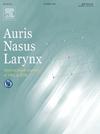Postoperative pathological findings and prognosis of early laryngeal and pharyngeal cancer treated with transoral surgery
IF 1.6
4区 医学
Q2 OTORHINOLARYNGOLOGY
引用次数: 0
Abstract
Objective
Transoral surgery for early-stage pharyngeal and laryngeal cancer provides good local control and is less invasive than external incisions. Postoperative pathological findings are considered the most important indicators for determining postoperative treatment, but detailed criteria have not been established. In this study, we evaluated the impact of postoperative pathological findings on prognosis of patients undergoing transoral surgery.
Methods
This study included patients with oropharyngeal, hypopharyngeal, and supraglottic cancer who underwent transoral surgery at Gifu University Hospital from April 2016 to December 2023. Resection margins were pathologically evaluated with horizontal and vertical margins, and vascular invasion was evaluated in three categories: lymphatic invasion, venous invasion, and perineural invasion. The correlation between each postoperative pathological finding and prognosis was evaluated.
Results
A total of 70 cases were assessed in this study. Cases of horizontal margin positive were 38.6 %, and cases of vertical margin positive were 27.1 %. Prognoses were comparable to previous reports. Despite the high margin positive rate, the 5-year overall survival rate was 77.1 %. The 5-year disease-specific survival rate was 89.7 %, and the 5-year local control rate was 85.3 %. Notably, when evaluated by margin direction, cases with positive horizontal margins had significantly worse prognoses. Although no significant correlation was found between vascular invasion and prognosis, cases of venous invasion tended to have a higher local recurrence rate.
Conclusion
This study suggests that transoral surgery has good prognosis despite a high positive-margin rate. However, detailed criteria for additional treatment have not been developed, and further case accumulation is required. Intriguingly, positive horizontal margins are correlated with significantly worse prognosis. This result may be related to a high risk of multiple cancers, and careful follow-up after surgery is recommended.
经口手术治疗早期喉癌和咽癌的术后病理结果和预后
目的经口手术治疗早期咽癌和喉癌具有良好的局部控制效果,而且创伤小于体外切口。术后病理结果被认为是决定术后治疗的最重要指标,但详细标准尚未确定。本研究评估了术后病理结果对经口手术患者预后的影响。本研究纳入了2016年4月至2023年12月期间在岐阜大学医院接受经口手术的口咽、下咽和声门上癌患者。切除边缘按水平边缘和垂直边缘进行病理评估,血管侵犯按淋巴侵犯、静脉侵犯和会厌侵犯三类进行评估。结果 本研究共评估了 70 例病例。水平边缘阳性病例占 38.6%,垂直边缘阳性病例占 27.1%。预后与之前的报告相当。尽管边缘阳性率较高,但5年总生存率为77.1%。5年疾病特异性生存率为89.7%,5年局部控制率为85.3%。值得注意的是,按边缘方向评估,水平边缘阳性的病例预后明显较差。虽然血管侵犯与预后之间没有发现明显的相关性,但静脉侵犯的病例往往有较高的局部复发率。然而,额外治疗的详细标准尚未制定,还需要进一步的病例积累。耐人寻味的是,水平边缘阳性与预后明显较差相关。这一结果可能与多发性癌症的高风险有关,建议术后仔细随访。
本文章由计算机程序翻译,如有差异,请以英文原文为准。
求助全文
约1分钟内获得全文
求助全文
来源期刊

Auris Nasus Larynx
医学-耳鼻喉科学
CiteScore
3.40
自引率
5.90%
发文量
169
审稿时长
30 days
期刊介绍:
The international journal Auris Nasus Larynx provides the opportunity for rapid, carefully reviewed publications concerning the fundamental and clinical aspects of otorhinolaryngology and related fields. This includes otology, neurotology, bronchoesophagology, laryngology, rhinology, allergology, head and neck medicine and oncologic surgery, maxillofacial and plastic surgery, audiology, speech science.
Original papers, short communications and original case reports can be submitted. Reviews on recent developments are invited regularly and Letters to the Editor commenting on papers or any aspect of Auris Nasus Larynx are welcomed.
Founded in 1973 and previously published by the Society for Promotion of International Otorhinolaryngology, the journal is now the official English-language journal of the Oto-Rhino-Laryngological Society of Japan, Inc. The aim of its new international Editorial Board is to make Auris Nasus Larynx an international forum for high quality research and clinical sciences.
 求助内容:
求助内容: 应助结果提醒方式:
应助结果提醒方式:


